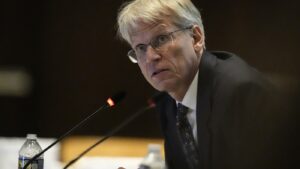
WASHINGTON (AP) — The president of the University of Virginia, James Ryan, announced his resignation on Friday, citing intense pressure from conservative critics and the Trump administration over the university’s diversity, equity, and inclusion (DEI) practices. Ryan, who has led the institution since 2018, stated he would step down rather than “fight the federal government.”
The resignation marks a significant escalation in the Trump administration’s efforts to reshape higher education, particularly at public universities. This move broadens the administration’s focus from Ivy League schools to include public institutions, with a specific emphasis on DEI policies rather than previous accusations of antisemitism tolerance.
Ryan faced criticism for allegedly not complying with federal orders to dismantle DEI policies. The Justice Department reportedly pushed for his resignation as part of an investigation into the university, according to a source speaking on condition of anonymity.
Pressure from the Trump Administration
In a statement to the university community, Ryan expressed his deep commitment to the institution but acknowledged the untenable position he faced. “To make a long story short, I am inclined to fight for what I believe in, and I believe deeply in this University,” he said. “But I cannot make a unilateral decision to fight the federal government in order to save my job.”
Ryan planned to leave his position next year but decided to resign earlier to avoid “knowingly and willingly sacrificing this community.” The New York Times first reported his resignation and the Justice Department’s involvement, though the department declined to comment.
“This is a dark day for the University of Virginia, a dark day for higher education, and it promises more of the same,” said Ted Mitchell, president of the American Council on Education.
Political Reactions and Implications
Virginia’s Democratic senators, Mark R. Warner and Tim Kaine, condemned the administration’s actions in a joint statement, calling it a mistake that harms Virginia’s future. “This is outrageous,” they said, criticizing the administration’s use of “‘culture war’ traps.”
Following a campaign promise to end “wokeness” in education, Trump signed an executive order in January to eliminate DEI programs nationwide. The Education Department has since launched investigations into numerous colleges, alleging that diversity initiatives discriminate against white and Asian American students.
Responses from educational institutions have varied. Some have closed DEI offices and ended diversity scholarships, while others have rebranded their initiatives or maintained their policies.
University of Virginia’s Position
The University of Virginia became a focal point after accusations of merely renaming its DEI initiatives. In March, the university’s governing body voted to close the DEI office and end diversity policies in admissions, hiring, and financial aid, a move celebrated by Republican Gov. Glenn Youngkin.
America First Legal, a conservative group founded by Trump aide Stephen Miller, highlighted the university’s actions in a letter to the Justice Department, accusing it of maintaining DEI programs under new names. The group criticized Ryan for signing a statement against the administration’s “overreach and political interference.”
“This week’s developments make clear: public universities that accept federal funds do not have a license to violate the Constitution,” said Megan Redshaw, an attorney at America First Legal.
James Ryan’s Tenure and Legacy
Ryan joined the University of Virginia in 2018, having previously served as the dean of Harvard University’s Graduate School of Education. His tenure at UVA was marked by efforts to enhance faculty diversity, a priority noted in his biography on Harvard’s website.
The Trump administration previously focused on elite institutions like Harvard, which has faced significant financial pressure, losing over $2.6 billion in federal research grants. Public universities, more reliant on taxpayer funding, may be more vulnerable to such pressures. The University of Virginia’s $10 billion endowment is substantial for a public university, but most have far less.
The Associated Press’ education coverage receives financial support from various private foundations. AP maintains editorial independence in its reporting.







